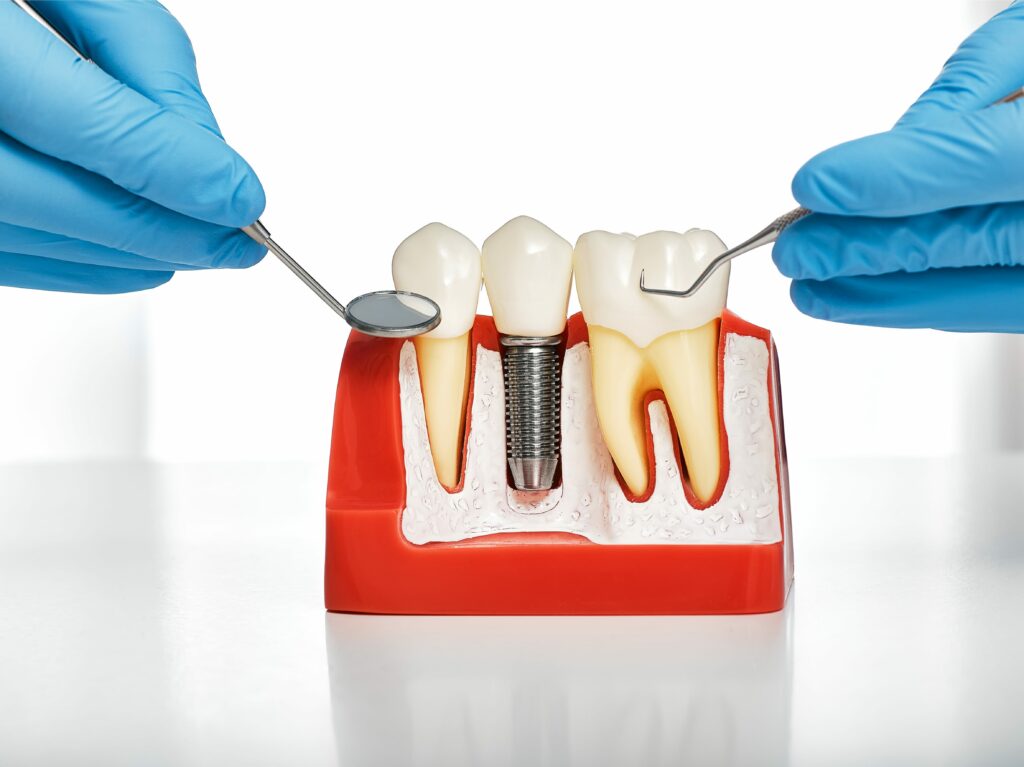Keeping Your Implants In
Patients practice oral hygiene and schedule regular oral exams to keep their teeth healthy and strong. But even with good habits, accidents, like a knocked-out tooth, can happen. Everyone knows it’s possible to lose a permanent tooth, even if they’d do anything to avoid it. But what about artificial teeth? Can a dental implant fall out?
Yes, a dental implant can fall out. However, it won’t loosen or come out without reason, such as injury or infection. When dental implants are placed correctly in a patient with healthy gums and jaw, dental implants are as secure as any permanent, natural tooth.
So how do dental implants work, and what might cause them to fall out?
What Is A Dental Implant?
When a tooth is lost because of injury, tooth decay, or disease, a dental implant may be added to improve function, comfort, and appearance. A dental implant is used as an artificial root. An artificial tooth (such as a crown or bridge) attaches on top. The implant is made of titanium and placed in the jaw. Healthy gums and bone tissue grow and hold the implant as the surgery site heals, similar to natural teeth.
In dental implant surgery, the jawbone and gums are given time to heal after inserting the titanium implant. Then, a post is fitted to the implant. Finally, a custom artificial tooth is crafted, fitted, and bonded in place.
Dental implants have a success rate of up to 98%. With proper care, including regular comprehensive oral exams and dental hygiene at home, dental implants can last for many years.

What Causes Implants to Fall Out?
Dental implants can last a lifetime, just as natural teeth can. However, some factors can interfere with the stability and durability of your implants. Some reasons for implant failure include gum disease, bone loss, poor dental hygiene, foreign body rejection, or an allergic reaction.
Although less common, it’s also possible to experience an injury, such as a blow to the face, which may loosen a dental implant. A knocked-out tooth (or implant) is a dental emergency. Patients should contact us for an emergency care appointment as soon as possible.
Gum Disease
Gum disease is an inflammation of the gums, commonly caused by a buildup of dental plaque, a sticky bacteria film. When plaque isn’t brushed and flossed away, it hardens into tartar, which must be removed by a dentist.
The bacteria in tartar can cause an infection below the gum line. The infection begins as gingivitis, a reversible and mild form of gum disease. During the early stages, gum disease irritates and erodes healthy gum tissue. However, untreated, it can progress into more severe gum disease, periodontitis.
Eventually, the worsening infection can cause:
- Gum recession
- Pus or discharge
- Bleeding, swollen, or tender gums
- Tooth loss or loose teeth
- Increased risk of heart attacks or strokes
- Bone loss (jaw)
Regular dental exams and cleanings every 6 months allow dentists to assess your gum health and prevent bacteria buildup. We can also recommend additional treatments or offer advice about dental hygiene at home.
Bone Loss
Bone loss can be caused by disease or infection, including periodontal disease, osteoporosis, or jaw cancer. When possible, your dentist will screen for any conditions that may impact your dental implant and oral health before surgery. However, if bone loss develops after surgery, it can cause the dental implant to loosen or fall out.
Dental implants attach to your jawbone, so patients must have healthy jaw tissue. If the patient’s jawbone has shrunk or can’t accommodate a sturdy hold for the implant, the patient may be a candidate for a bone graft. A bone graft adds new bone tissue to the jawbone. Notably, it requires additional healing time before the dental implant can be inserted.
Poor Dental Hygiene
The same factors that can cause natural teeth to fall out can also cause dental implants to loosen. Everyone has moments where they forget to floss, misplace a toothbrush on a trip, or enjoy a surgery snack or drink. Although caring for your oral health every day increases the benefits, it’s most important to practice good habits long-term.
The Canadian Dental Association (CDA) recommends these oral health tips:
- Visit your dentist regularly
- Brush at least twice daily
- Wait 20–30 minutes after eating to brush
- Floss at least once daily
- Eat a well-balanced diet
- Avoid smoking & vaping
Foreign Body Rejection or Allergic Reaction
Although very rare, sometimes our bodies recognize surgical implants as foreign bodies. For example, a splinter is a foreign body and can cause pain, irritation, or swelling. The same can happen in your mouth if your body rejects the implant or experiences an allergic reaction to the foreign body.
For example, if a patient has an unknown titanium allergy, they may experience localized skin rashes or implant failure.
Unfortunately, you can’t prevent foreign body rejection or an allergic reaction. However, it’s crucial to note any continuing discomfort or swelling after implant surgery. Talk to your dentist if you feel pain or swelling.
Your dentist can assess the surgery site to determine if the implant is healing as expected or if you are experiencing complications. Then, your dentist can recommend options for your oral health needs.
Checkups Help Maintain Dental Implants
Keeping your teeth healthy isn’t just for natural teeth. When you maintain your oral health, it can benefit your whole body and prevent dental implants from falling out. Practicing dental hygiene habits at home can make a significant difference in protecting your health. Still, it’s also crucial to schedule regular dental appointments.
We can assess the health of your implants, fillings, crowns, and more. Book an appointment with Palermo Village Dental to keep your smile healthy.




